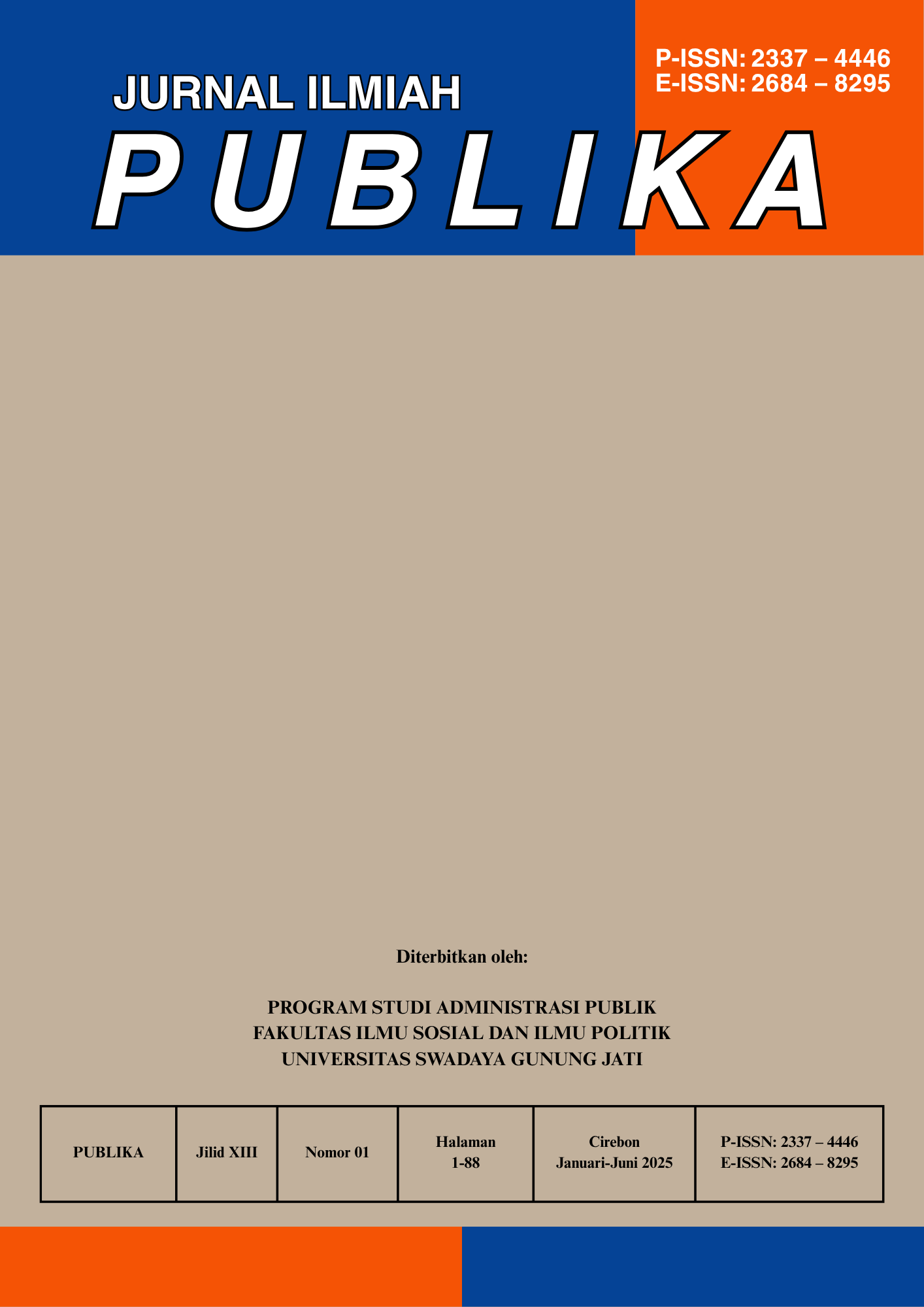Pengelolaan Sumber Daya Manusia Dalam Kepemimpinan Generasi Z Di Era Digital
(Studi Kasus Pada Organisasi Jabar Bergerak Zillenial Kota Cirebon)
DOI:
https://doi.org/10.33603/publika.v13i1.9686Abstract
This study aims to explore human resource management (HRM) within the context of Generation Z leadership in the digital era, using a case study of the Jabar Bergerak Zillenial organization in Cirebon City. As digital natives, Generation Z leaders possess unique characteristics in leadership and HR management. The study employs a qualitative approach with a case study method, utilizing in-depth interviews, participatory observation, and document analysis. The findings reveal that Generation Z leadership emphasizes the use of technology, rapid communication, and work flexibility. Core values such as collaboration, openness, and results orientation underpin team management practices. Digital technology adaptation also plays a key role in training, coordination, and performance evaluation. The main challenge lies in balancing young workers’ need for flexibility with the organization’s performance goals. The study recommends that Gen Z-led organizations develop adaptive HRM strategies that foster creativity, recognize individual achievements, and create a supportive work environment that enhances digital skills to improve overall effectiveness and performance.
References
Adam, A. (2017). Mengikuti Keseharian Generasi Z Golongan Pertama. https://tirto.id/mengikuti-keseharian-generasi-z-golongan-pertama-ctLk
Adecco USA. (2016). Yes , It Matters : What Millennials and Gen Z Really Think About Work. https://www.adeccousa.com/~/media/AdeccoGroup/Brands/Adecco%20Glob al%202016/USA/media/downloads/what-millennials-and-gen-z-really-thinkabout-work.pdf
Bencsik, A., Juhász, T., & Horváth-Csikós, G. (2016). Y and Z Generations at Workplaces. Journal of Competitiveness, 6(3), 90–106. https://doi.org/10.7441/joc.2016.03.06 Clark, J. (2017). Generation Z: Are We Ready for the New Workforce? https://www.entrepreneur.com/article/296262
Bondarouk, Tanya, Huub Ruel, and Beatrice Van Den Heijden. (2009). E-HRM Effectiveness in a Public Sector Organization : A Multi Stakeholder Perspective. The International Journal of Human Resource Management. Bol. 20, No. 3, pp. 578-590.
Bondarouk, T., Parry, E., & Furtmueller, E. (2017). Electronic HRM: Four Decades of Research on Adoption and Consequences. International Journal of Human Resource Management, 28(1), 98-131.
Calk, R., & Patrick, A. (2017). Millennials Through The Looking Glass: Workplace Motivating Factors. The Journal of Business Inquiry, 16(2), 131– 139. http:www.uvu.edu/woodbury/jbi/volume16
Febrianti, D., Oktarini, K. W., & Firza, E. (2024). The External Control of Organization; A Resource Dependence Perspective (The Book Review). Journal of Management, Entrepreneur and Cooperative, 3(1), 13-24.
Gibb, T. J., & Oseto, C. (2020). Insect Collection and Identification (Ruby Smith, Ed.; 2nd Ed., Vol. 2). Charlotte Cockle.
Mathis, R. L., & Jackson, J. H. (2008). Human Resource Management. https://doi.org/10.1055/s-0030-1270560
Marler, J. H., & Fisher, S. L. (2013). An evidence-based review of e-HRM and strategic human resource management. Human Resource Management Review, 23(1), 18±36. https://doi.org/10.1016/j.hrmr.2012.06.002
Laudert, E. (2018). Generation Z: Utilizing adaptive and authentic leadership to promote intergenerational collaboration at work [M.A. in Leadership Studies: Capstone Project]. The University of San Diego.
Stillman, D., & John Stillman. (2018). Generasi Z: Memahami Karakter Generasi Baru yang Akan Mengubah Dunia Kerja. Jakarta: PT Gramedia Pustaka Utama.
Ozkan, M., & Solmaz, B. (2015). The changing face of the employees Generation Z and their perceptions of work (A study applied to university students). Procedia Economics and Finance, 26(1), 476483.
Twenge, J. M. (2017). iGen: Why today's super-connected kids are growing up less rebellious, more tolerant, less happy--and completely unprepared for adulthood-- and what that means for the rest of us. Simon and Schuster.
Taylor, W (2014). Cambridge IGCSE Development Studies Students book. England: Cambridge University Press.
Turner, Rochelle. (2015). Travel & Tourism Economic Impact 2015. London: World Travel & Tourism Council
Poernomo, B. (2020, July). Peran Perguruan Tinggi Dalam Menyiapkan Pemimpin Masa Depan menghadapi Era VUCA. InProsiding Seminar STIAMI(Vol. 7, No. 2, pp. 70-80).
Tulungen, E. E., Saerang, D. P., & Maramis, J. B. (2022). Transformasi Digital: Peran Kepemimpinan Digital.Jurnal EMBA: Jurnal Riset Ekonomi, Manajemen, Bisnis dan Akuntansi,10(2).
Villa, D. (2017). The State of Gen Z 2017 : Meet the Throwback Generation. The Center For Generational Kinetics, (April). http://genhq.com/gen-z-2017- research-white-paper/
Gaya Kepemimpinan Efektif Untuk Kinerja Maksimal Ala Gen Z . (2024, Oktober 25). Diakses dari http://mum.id/news/gayakepemimpinan-efektif-untukkinerja-maksimal-ala-gen-z
Amellia. (2024, 26 Oktober). Wawancara Personal. Dhiya Safira. (2024, 30 Oktober). Wawancara Personal
Downloads
Published
Issue
Section
Citation Check
License
The Authors submitting a manuscript do so on the understanding that if accepted for publication, copyright of the article shall be assigned to Jurnal Ilmiah Publika Prodi Administrasi Publik. Universitas Swadaya Gunung Jati as publisher of the journal. Copyright encompasses rights to reproduce and deliver the article in all form and media, including reprints, photographs, microfilms, and any other similar reproductions, as well as translations.
Jurnal Ilmiah Publika, Universitas Swadaya Gunung Jati and the Editors make every effort to ensure that no wrong or misleading data, opinions or statements be published in the journal. In any way, the contents of the articles and advertisements published in Jurnal Ilmiah Publika are the sole responsibility of their respective authors and advertisers.










